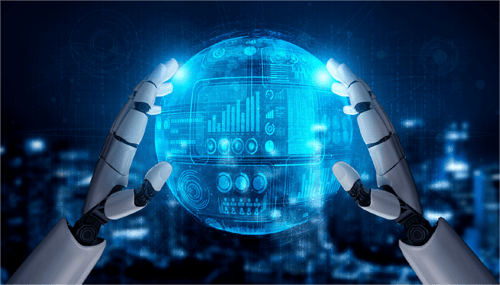Survey Results: Generative AI in Software Development Teams—Productivity and Challenges
Generative AI in Software Development FAQs addressed in this article:
-
What percentage of software development teams are already using AI in their processes? – According to the “AI Adoption in Software Development Survey Report 2023” by Bito.ai, 42% of survey participants are already using AI in their software development processes.
-
How does AI improve code quality in software development? – AI tools analyze vast amounts of code and identify patterns, offering suggestions that improve code efficiency and reduce the likelihood of errors, thereby enhancing code quality.
-
What are the primary benefits of using AI in software development? – The primary benefits include improved code quality, accelerated learning of the codebase, increased developer satisfaction, and significant productivity gains.
-
What is the expected increase in productivity from AI adoption in software development teams? – About 31% of highly effective software teams have seen their productivity increase by over 60% through the adoption of AI, with 33% of all types of teams anticipating similar productivity gains in the next 18 months.
-
What are the main challenges faced by teams integrating AI into software development? – The main challenges include accuracy and reliability issues, data privacy concerns, limited customization options, the learning curve on new tools, cost implications, and resistance to trying new tools.
-
How many developers expect their companies to incorporate AI software tools into their workflow over the next two years? – Over 70% of developers expect their companies to incorporate AI software tools into their workflow over the next two years.
-
What role does Cprime play in the integration of AI in software development? – Cprime offers AI services designed to address the challenges of AI adoption in software development, providing tailored solutions that enhance code quality, accelerate learning, and foster innovation.
-
Why is data privacy a significant concern in adopting AI tools in software development? – Data privacy is a significant concern because the adoption of AI tools raises important questions about how data is used and protected, especially in large organizations that must adhere to stringent data protection standards.
As developers and engineering teams seek innovative ways to enhance efficiency, code quality, and overall productivity, AI tools have emerged as pivotal assets in their arsenal. The “AI Adoption in Software Development Survey Report 2023,” conducted by Bito.ai, offers a comprehensive look into how generative AI is reshaping the software development industry. This survey, encompassing responses from over 700 developers, engineering managers, and executives, sheds light on the integration of generative AI in software development, its benefits, and the challenges faced by professionals in the field.
This blog post aims to distill the key points from the survey, offering a glimpse into the transformative impact of AI on software development processes. From the adoption rates and benefits to the anticipated future trends and challenges, we’ll explore how AI is becoming an integral part of the software development ecosystem. Additionally, we’ll touch upon how Cprime’s AI services align with these insights, providing solutions that cater to the evolving needs of software teams.
The Current Landscape of AI in Software Development
The integration of Artificial Intelligence into software development is not just a trend but a significant shift in how software teams approach their projects. According to the “AI Adoption in Software Development Survey Report 2023” by Bito.ai, a notable 42% of survey participants are already harnessing AI in their software development processes, with an additional 30% currently experimenting with its capabilities. This data underscores the growing recognition within the industry of AI’s potential to revolutionize software development practices.
More intriguing is the correlation between the effectiveness of software teams and their adoption of AI tools. The survey reveals that 45% of highly effective software teams are already broadly using AI tools in their development process. This statistic suggests a strong link between AI adoption and enhanced team performance, highlighting AI’s role in driving software development excellence.
The enthusiasm for AI among software teams is not unfounded. The primary benefits cited by survey participants include improved code quality, accelerated learning of the codebase, and increased developer satisfaction. These advantages point to AI’s capacity to not only enhance the technical aspects of software development but also to positively impact the overall work environment and team morale.
In this evolving landscape, Cprime’s AI services emerge as a valuable resource for teams looking to navigate the complexities of AI adoption. By offering tailored solutions that address the specific needs and challenges of software development, Cprime is well-positioned to help teams unlock the full potential of AI in their projects.
The Benefits of AI Adoption
The adoption of generative AI in software development is a transformative force, bringing about significant improvements in various aspects of the development process. The survey report by Bito.ai highlights several key benefits that have been driving the increasing integration of AI tools in software development teams.
Improved Code Quality
One of the most significant benefits reported by survey participants is the enhancement of code quality. AI tools, with their ability to analyze vast amounts of code and identify patterns, can offer suggestions that improve code efficiency and reduce the likelihood of errors. This capability is invaluable in a field where the cost of mistakes can be high, both in terms of financial resources and development time.
Accelerated Learning of the Codebase
For new team members or even seasoned developers working on large projects, getting up to speed with the existing codebase can be a daunting task. AI tools facilitate a faster understanding of the code structure and logic, enabling developers to become productive more quickly. This accelerated learning curve is particularly beneficial in today’s fast-paced development environments, where time is often of the essence.
Increased Developer Satisfaction
The survey also points to an increase in developer satisfaction as a notable benefit of AI adoption. By automating routine tasks and offering intelligent suggestions, AI tools can free developers to focus on more creative and challenging aspects of software development. This shift not only enhances job satisfaction but can also lead to more innovative solutions and a more engaged development team.
Productivity Boost
Perhaps one of the most compelling findings from the survey is the significant productivity increase reported by highly effective software teams. A remarkable 31% of these teams have seen their productivity increase by over 60% through the adoption of AI. This statistic underscores the potential of AI to not only improve individual aspects of the development process but to fundamentally enhance the overall efficiency and output of software teams.
As we look to the future, the anticipated productivity gains from AI adoption are even more promising. Approximately 33% of all types of teams expect an uptick in productivity greater than 60% in the next 18 months due to AI. This optimism reflects a growing confidence in AI’s ability to drive substantial improvements in software development productivity.
In light of these benefits, Cprime’s CodeBoost™ coding assistant solution is specifically designed to help software development teams harness the full potential of AI. By offering solutions that improve code quality, accelerate learning, and increase developer satisfaction, Cprime aims to empower teams to achieve greater efficiency and innovation.
Challenges in AI Adoption
While the adoption of generative AI in software development heralds a new era of efficiency and innovation, it is not without its challenges. The survey report provides valuable insights into the hurdles that developers, engineering managers, and executives face as they integrate AI into their workflows. Understanding these challenges is crucial for organizations looking to harness the full potential of AI in software development.
Accuracy and Reliability Issues
One of the primary concerns highlighted in the survey is the accuracy and reliability of AI tools. Developers rely on AI to provide suggestions and automate tasks that can significantly impact the quality of the final product. Any inaccuracies or inconsistencies in AI outputs can lead to setbacks and increased debugging time, underscoring the need for continuous improvement in AI technologies.
Data Privacy Concerns
With the increasing emphasis on data security and privacy, the adoption of AI tools raises important questions about how data is used and protected. Large organizations, in particular, cite data privacy as their primary challenge in adopting AI tools. Ensuring that AI systems adhere to stringent data protection standards is paramount for their successful integration into software development processes.
Limited Customization Options
The survey also points to limited customization options as a hurdle for some teams. The ability to tailor AI tools to fit specific project needs and workflows is essential for maximizing their effectiveness. Addressing this challenge requires a concerted effort from AI tool providers to offer more flexible and adaptable solutions.
Learning Curve on New Tools
The introduction of AI into software development workflows often comes with a learning curve. Developers may need to acquire new skills or adapt to different methodologies, which can temporarily slow down productivity. Providing adequate training and resources is key to smoothing this transition and ensuring that teams can quickly leverage AI’s benefits.
Cost Implications
The financial aspect of implementing AI tools is another consideration for many organizations. While the long-term benefits of AI can be substantial, the initial investment and ongoing costs associated with AI software and infrastructure can be a barrier for some, especially smaller companies.
Resistance to Trying New Tools
Finally, the survey highlights a natural resistance to change that can impede AI adoption. Introducing new technologies into established workflows can meet with skepticism or reluctance from team members accustomed to traditional methods. Overcoming this resistance requires demonstrating the tangible benefits of AI and fostering a culture of innovation and continuous learning.
At Cprime, we are committed to helping software development teams navigate this evolving landscape. Our AI services are designed to address the challenges highlighted in the survey, providing tailored solutions that leverage the full potential of AI. By offering tools and expertise that enhance code quality, accelerate learning, and foster innovation, Cprime aims to empower teams to achieve greater efficiency and success in their projects.
As we look ahead, the integration of AI into software development practices is set to redefine what is possible, driving the industry towards new horizons of productivity and innovation. Cprime is excited to be at the forefront of this transformation, partnering with software teams to unlock the transformative power of AI.


